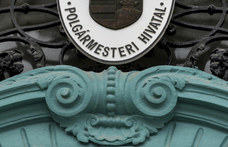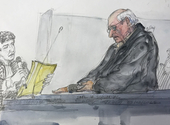Laszlo Lengyel: a third nationalist wave?
In countries that have experienced regime changes, an economic crisis could give birth to a third wave of nationalism. The middle classes could find themselves facing an existential threat. People who were winners until now will lose out. Modernisers, those who urge the country in the direction of Europe, people who work in high-tech professions and those who have taken out loans in Swiss franks - they could all lose their jobs, their savings and their networks of contacts.
Marosvásárhely 1990: tanks separating Hungarian and Romanian demonstrators © MTI |
New histories were written: stories in which Hungarians, Romanians, Croats, Serbs, Czechs, Slovaks, Poles and Ukrainians had each suffered unique and terrible injustices. New states, symbols, anthems and uniforms were created. All this was drawn from a deep well of history, yet it was still new. Among the south Slavs, this new history was written in blood.
This first wave of nationalism died out in the mid-1990s. It was replaced by a kind of dual promise: on the one hand the promise of Europeanisation, of joining Nato and the European Union, and on the other, by the Left's promise that the security of the earlier Socialist period could be restored. Calm down, sit down and talk, leave the minorities alone, stop the Jew-baiting - otherwise you can't join the EU - this was the message of Clinton's America and Kohl's Germany. People chose European standards of living over national misery. Countries began a race to join Europe.
In the new millennium, when it became clear to central Europeans that NATO and EU membership was a certainty, the promise lost its power, leading to anger about the efforts required to achieve the goal. A struggle began for the ownership and control of political and economic life and the media in these countries. Nationalists and liberals, modernisers and anti-modernisers, pro-Europeans and eurosceptics entered into a bloody conflict. All this coincided with the strong nationalist and Christian fundamentalist wave that hit America on 11 September 2001, which brought with it a desire to promote "colour" revolutions from Georgia to Ukraine.
A new, ethnic nationalist wave was launched, which peaked in Hungary in spring 2002, affecting the masses directly. Then, in March and April, hundreds of thousands donned national colours in mass demonstrations. The Right saw liberals and Bolshevik aliens wherever it looked, while the Left warned about the prospect of 20m Romanian workers arriving in Hungary. But then came social populism, which turned every Hungarian politician into a mini-Kadar. That's why Fidesz's referendum on dual citizenship failed in December 2004, at a time when Ukraine's Orange Revolution was elevating to feverish levels emotion in the Baltic states, Poland and Romania. This wave brought with it the Kaczynski twins in autumn 2005 and fed an increasingly extremist nationalist mood in the Baltic states. The Estonian-Russian dispute broke out in spring 2007, giving rise to an "ideology of defensive nationalism" aimed against Russia and Estonia's Russian minority.
But this trend seemed to correct itself. Poland's right-wing won the elections, Romania's extremists fell out of parliament, Hungary's extremists were marginalised. In Slovakia, Fico sews just enough nationalist salt as is required to maintain his coalition majority. The Georgian-Russian war failed to awaken any kind of mass opinion.
But maybe not. At a recent meeting of Slovak and Hungarian intellectuals, Peter Tolgyessy and Laszlo Szigeti from Slovakia both agreed that there had been a sustained trend of rising nationalism since the regime change. This was related to the illusions nursed by the various societies: they wanted a western lifestyle immediately, a prospect that seemed to be receding ever further. Politicians create nationalist, but the nationalist themselves create the Ficos, the Slotas and the Kaczynskis. Politicians just satisfy their voters' demands. The future is one of growing nationalism and xenophobia around the world, Szigeti added. He may be right.
My concern is the nationalist "third wave." This wave will emerge from the economic crisis. Now, it is the middle class that emerged after the regime change which is endangered. Brussels and Berlin have no answers to their cries for help. It's no longer the losers who are rioting - it's the people who until now have been winners. They are now the ones looking for scapegoats.
Disappointed forint nationalists, zloty nationalists, Czech crown nationalists who are eurosceptic but also claim to be western European are raising national flags in Gyor, Poznan and Mlada Boleslav. Bank employees and automotive engineers, property investors and respectable judges are developing a sympathy for their less sophisticated nationalist compatriots. They may begin to see Jews, Gypsies, Romanians, Slovaks, Europeans, Americans, and anybody who is no them, as the group responsible for their woes.
Happy 2009!

















